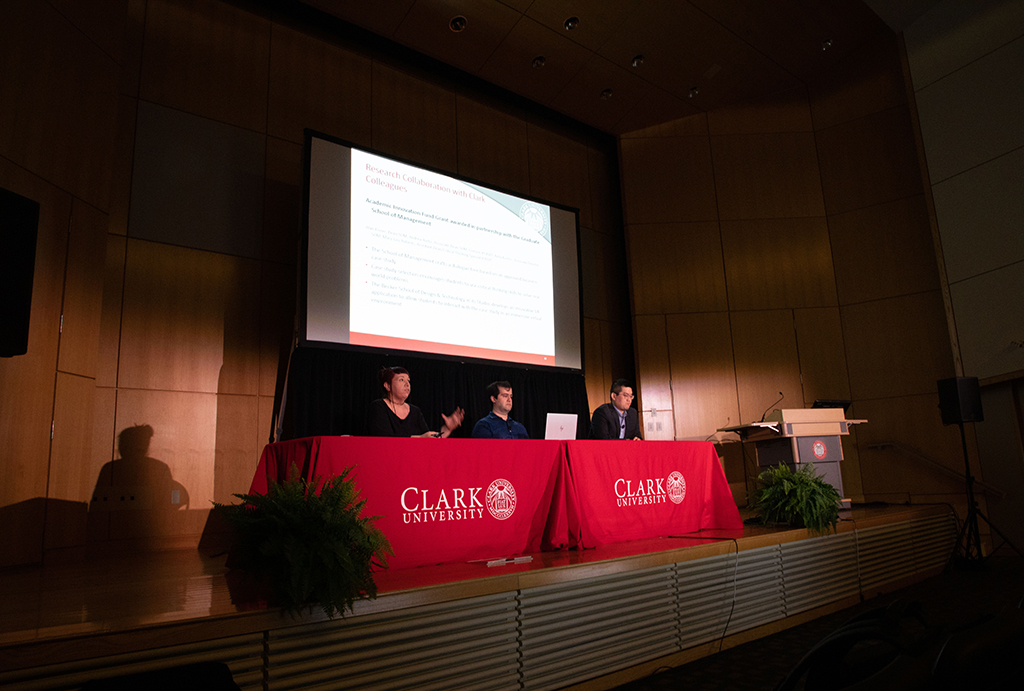INAUGURATION ACADEMIC SYMPOSIUM – APRIL 29, 2022
Faculty put advanced digital technology to use in the classroom and lab

From virtual reality to blockchain to YouTube, Clark faculty in 2022 are incorporating a wide range of emerging digital technologies in their research and teaching. As part of the April 29 pre-Inauguration Academic Symposium session on “Advances in Digital Technology,” three faculty from distinct disciplines — interactive media, management, and computer science — described how that looks in practice.
In “Fundamentals of Game Development,” a First-Year Intensive course last fall, Terrasa Ulm, director of the undergraduate interactive media program and a professor of practice in the Becker School of Design & Technology, introduced students to virtual reality (VR). They studied the history, then created VR programs through rapid prototyping.
“It’s wonderful to have introductory courses where you can allow students to build a comfort level and then realize that they’re totally capable of working with new technology, and understanding the history behind it, so it becomes more approachable,” Ulm said.
Ulm also discussed their research applying VR, which can deliver an immersive, powerful, 360-degree 3-D experience that allows a participant to embody an avatar and occlude the physical world. Ulm and a research partner developed a VR program through which graduate students in education could experience classroom situations as part of teacher training.
“An important part of virtual reality is the ability to go through scenarios that might not be as safe in reality,” like a physical altercation, Ulm said. “How you handle something with a young student is something you want to get right in the physical world but is something you can experience differently in virtual reality.”
In the School of Management, Hamidreza Ahady Dolatsara, an assistant professor, researches and teaches blockchain technology, a decentralized, computerized ledger that records and tracks transactions that use Bitcoin, non-fungible tokens (NFTs), and other cryptocurrencies. In his classes, students create NFTs using Solana, a public blockchain platform.
“One of the concerns with blockchain is that criminals are using it for crimes,” he said. “But the good thing is, it’s very transparent. You can trace all the transactions and catch those criminals. It’s even easier than with dollars.”
While many people still may not be comfortable with, or even understand, VR and blockchain technologies, almost everyone has encountered YouTube by now; it’s the second most popular social media platform, with 73 percent of adults reporting they’ve visited the website, according to Shuo Niu, assistant professor of computer science. He researches video sharing and its collaborative and community activities on social media.
Niu described his research showing the widespread impact of YouTube during the pandemic and the positive impact on viewers’ mental health through YouTube’s #StayHome #WithMe campaign and autonomous sensory meridian response (ASMR) videos.
“Videos that showed love got more views,” he explained. “People needed that kind of care.”
Read about the other sessions held for the Academic Symposium, one of the events celebrating the Inauguration of President David B. Fithian:
- Climate change work must extend beyond research
- Professors explore counternarratives of design and innovation
- Symposium session addresses Clark’s impact in the community
- The fraying of democracy is a global problem, professors say
- ‘The truth is what we see on the ground’
- Faculty researched, and learned from, the pandemic
- Life, and death, considered through the lens
- Academic Symposium inspires discussion on consequential concerns


